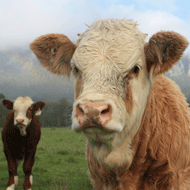New European centre to fight emerging diseases

Seventy-five per cent of emerging human infections originate in animals.
Scottish vets and scientists have joined forces in a new venture that aims to tackle emerging threats to pets and farm animals in Europe.
A new research centre opening in Edinburgh will aim to track outbreaks of infectious diseases that impact human health and can be devastating to the farming industry - for example, TB, influenza and bacterial infections that cause food poisoning.
“A number of potential threats exist within the European area, extending through to Africa and the Middle East as well," said Professor Geoff Simm, vice principal at Scotland's Rural College (SRUC), who will collaborate with other organisations involved in the new centre.
"With some 75 per cent of emerging human infections originating from animals – including Ebola, severe acute respiratory syndrome (SARS) and avian influenza – it is vital that we monitor and manage new threats as soon as they begin to appear.”
It is hoped experts will be able to detect emerging threats very early on and develop new vaccines, treatments and diagnostic tools to prevent the spread of disease.
The Centre of Excellence for Surveillance of Emerging Infectious Diseases in Europe will be co-ordinated from the University of Edinburgh's Easter Bush Campus.
The project is formed of a partnership between the Easter Bush Research Consortium (EBRC, which comprises the Roslin Institute, Scotland's Rural College, the Moredun Research Institute and the Royal (Dick) School of Veterinary Studies) and drug company Zoetis.
Professor David Argyle, head of Royal Dick vet school, said the partnership will be "incredibly important for controlling disease outbreaks across the continent.”



 The Greyhound Board of Great Britain has published new vaccination guidance, with all greyhounds registered from 1 January, 2027 required to have the L4 leptospirosis vaccination, rather than L2.
The Greyhound Board of Great Britain has published new vaccination guidance, with all greyhounds registered from 1 January, 2027 required to have the L4 leptospirosis vaccination, rather than L2.